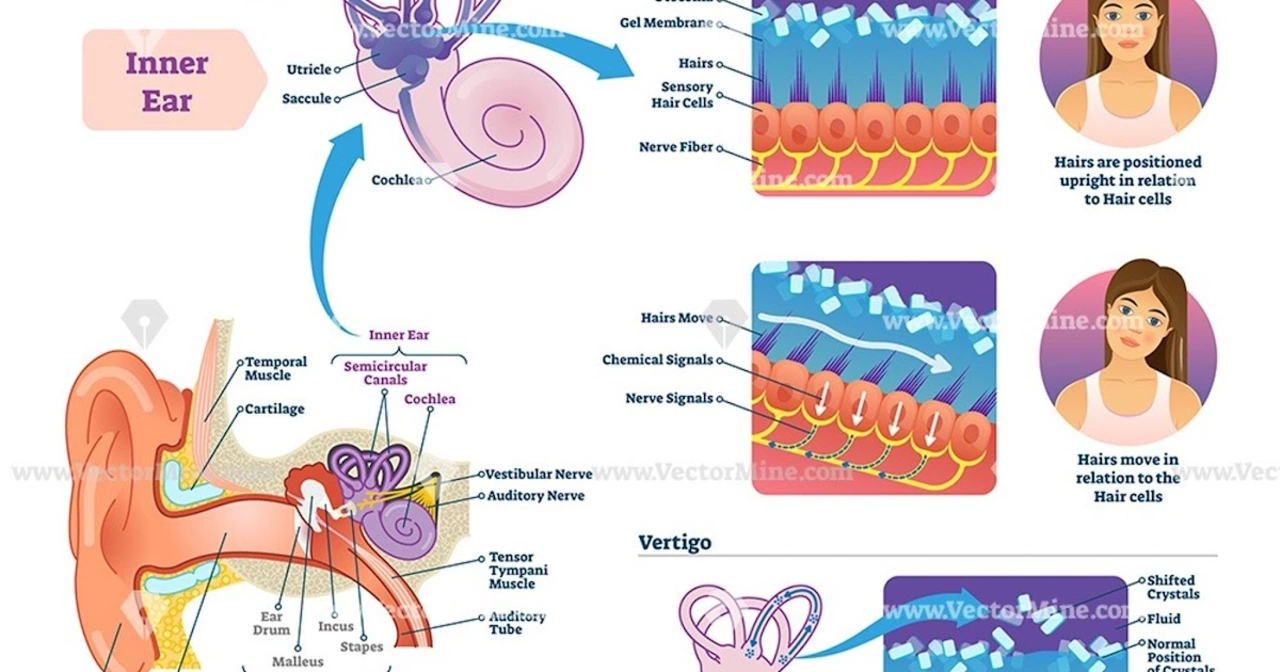An Introduction to Vertigo and Balance
As a blogger who is passionate about understanding the human body, I have been fascinated with the concept of vertigo and how it affects our balance system. Vertigo is a sensation of spinning or whirling, often accompanied by feelings of imbalance, dizziness, and even nausea. Understanding the science behind it and how our balance system works will hopefully help those who suffer from this condition, as well as those who are simply curious about the intricacies of the human body.
Understanding the Inner Ear: The Key to Balance
The inner ear plays a crucial role in maintaining our balance and spatial orientation. It consists of three main structures: the cochlea, which is responsible for our sense of hearing; the vestibule, which is responsible for detecting linear acceleration and gravity; and the semicircular canals, which are responsible for detecting angular acceleration. These structures work together to provide our brain with information about our body's position and movements, allowing us to maintain our balance and navigate through space.
How the Vestibular System Works
The vestibular system, which is part of the inner ear, is the primary sensory system responsible for maintaining our balance. It consists of two main components: the otolith organs (utricle and saccule) and the semicircular canals. The otolith organs detect linear acceleration and gravity, while the semicircular canals detect angular acceleration. These structures contain tiny hair cells that are responsible for converting mechanical movements into electrical signals, which are then sent to the brain for processing.
Vertigo: A Disruption in the Balance System
Vertigo occurs when there is a disruption or dysfunction in the balance system, usually within the inner ear or the vestibular nerve. This can be caused by various factors, such as inflammation, infection, injury, or even certain medications. When the balance system is disrupted, it sends incorrect or conflicting signals to the brain, leading to the sensation of spinning or whirling that characterizes vertigo. This can also cause other symptoms, such as dizziness, nausea, and loss of balance.
Common Causes of Vertigo
There are several common causes of vertigo, which can be divided into two main categories: peripheral and central. Peripheral vertigo is caused by issues within the inner ear, while central vertigo is caused by issues within the central nervous system. Some common causes of peripheral vertigo include benign paroxysmal positional vertigo (BPPV), Meniere's disease, and vestibular neuritis. Central vertigo, on the other hand, can be caused by conditions such as migraines, multiple sclerosis, or even brain tumors.
Treating and Managing Vertigo
Treatment for vertigo depends on the underlying cause, and it often involves a combination of medication, therapy, and lifestyle changes. Medications such as antihistamines, anticholinergics, and benzodiazepines can be used to help manage the symptoms of vertigo, while physical therapy and vestibular rehabilitation can help improve balance and spatial orientation. In some cases, treating the underlying cause of vertigo, such as an infection or inflammation, can also help alleviate symptoms. Additionally, making certain lifestyle changes, such as reducing stress and practicing good sleep hygiene, can help manage vertigo and improve overall quality of life.


Leia not 'your worship'
May 29, 2023 AT 14:50Jo Sta
May 29, 2023 AT 17:42KALPESH GANVIR
May 31, 2023 AT 06:11April Barrow
June 2, 2023 AT 04:30Melody Jiang
June 3, 2023 AT 12:48alex terzarede
June 5, 2023 AT 04:53Dipali patel
June 6, 2023 AT 14:41Jasmine L
June 6, 2023 AT 18:34lisa zebastian
June 7, 2023 AT 02:55Jessie Bellen
June 7, 2023 AT 12:28Jasmine Kara
June 7, 2023 AT 22:57Richie Lasit
June 7, 2023 AT 23:31arthur ball
June 9, 2023 AT 08:54Harrison Dearing
June 11, 2023 AT 03:08Justice Ward
June 12, 2023 AT 14:08bhuvanesh kankani
June 12, 2023 AT 19:34maria norman
June 13, 2023 AT 19:32Iris Schaper
June 14, 2023 AT 02:25katerine rose
June 14, 2023 AT 11:20Selma Cey
June 14, 2023 AT 22:55